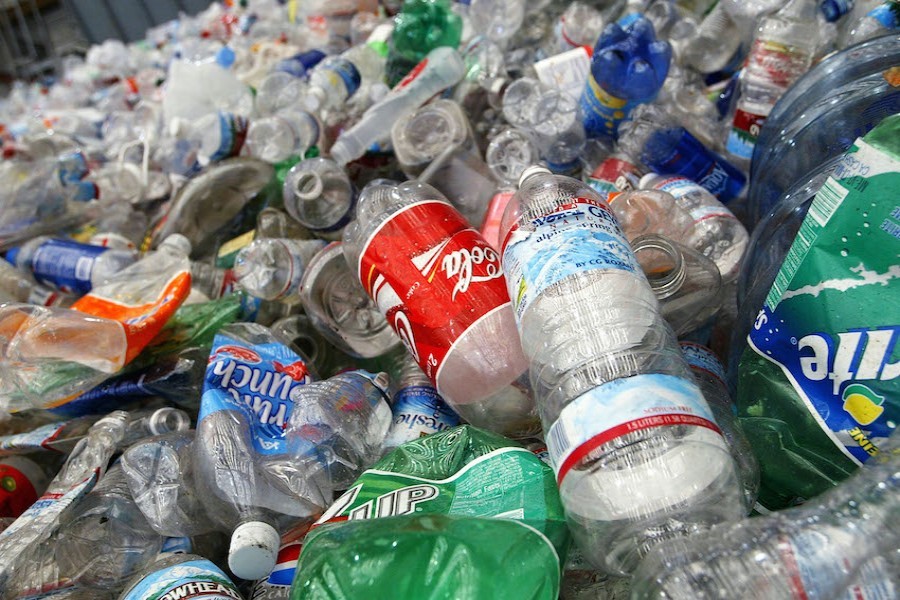Exporters of plastic bottle waste are passing through tough times following a recent Chinese ban on its import, sector insiders said.
Some exporters have already switched to other trades as their shipments took a nosedive while many are struggling hard to survive.
Export earnings from polyethylene terephthalate (PET) bottle flakes dropped by more than 51 per cent in the past 10 months of the fiscal year 2017-18, shows an official figure.
According to Export Promotion Bureau data, the sector earned $12.83 million in the July-April period of the current fiscal as against $26.35 million in the corresponding period of the FY 2016-17.
China imported 99 per cent of Bangladeshi PET waste flakes.
The Chinese government announced the ban last July, but it came into force on January 01.
The ban was imposed on the imports of 24 categories of solid waste, including certain types of plastics, paper and textiles.
Bangladesh exports more than 50,000 tonnes of PET bottle flakes a year, valued at $25 million.
"I've switched to import-oriented trade after the Chinese ban," said MA Samad, who now imports cosmetic items from abroad.
Several others have followed in his footsteps while many are closely observing the situation, he said.
"I used to earn Tk 1.0 million to Tk 1.5 million from PET flakes export a month," Mr Samad said.
He would export 10 to 12 containers of PET flakes each month. Every container carried 22 to 25 tonnes of products, he recalled.
"After the ban, my export volume declined significantly. So, there was no alternative but to close the business," he added.
"We came to know China will relocate their polyester staple fibre factories to Vietnam and Cambodia. If this happens, we'll get opportunities to export our goods again," Mr Samad said.
But there is a slim chance to revive the sector immediately, he added.
Titu, another exporter of PET flakes, said many are trying to export products to India, but terms and conditions set by the Indian buyers do not match actually.
That is why many exporters already cancelled shipments to the neighbouring country, he added.
Some of them are supplying PET flakes to local market, but the volume is not high, he mentioned.
"I'm yet to decide on the closure of my units. It depends on the situation…," Mr Titu said.
Bangladeshi PET flake exporters were fully depended on Chinese market. So, the ban is a big blow for them, said Sarwar Wadud Chowdhury, former president of Bangladesh PET Flakes Manufacturers and Exporters Association (BPFMEA).
Although India imports a little volume of PET flakes, he said, exporters are not getting good prices.
Besides, buyers from the neighbouring country also bargain about quality.
If poly staple fibre factories of waste materials are established in the country, this crisis will go, he hoped.
"We have heard some Chinese and Indian companies will invest in fibre factories in Bangladesh, but we're yet to see any development to this end," he said.
Currently, some geo-textile factories are purchasing local PET flakes. If such industry flourishes, their sales will rise further, he observed.
A large volume of PET flakes remained stockpiled in many factories because of no shipment of the product, he cited.
More than 60 PET flake exporters are operating their business under the BPFMEA.
According to the EPB data, the sector missed the strategic target by more than 61 per cent.
The government fixed the target at $33.34 million for the July-April period.
Contacted, Iftekhar Enayetullah, co-founder and director of Waste Concern, said the government should give policy support to this sector.
"Unutilised PET bottle waste will cause environmental hazards. So, proper waste management system should be developed to turn waste into resources," he added.
"We've been suggesting the authorities concerned for a long to apply two-bin system waste collection method," said Mr Enayetullah.
If waste is collected separately, it will be helpful to use in recycle industries. Otherwise, such waste will pollute environment, he cautioned.
Beside, industries should be given benefits like tax holiday and bank support to encourage investment in this sector.
Bangladesh imports nearly 142,000 tonnes of PET resins worth more than $142 million (minimum price US$ 1,000 per tonne) a year for producing PET bottles and synthetic yarn.
Of the total volume, about 88,000 tonnes are bottle-grade and 54,000 tonne textile-grade resins.
On average, 4.0 billion PET bottles and jars are produced each year. About 3.40 billion PET bottles are discarded after one-time use yearly.


